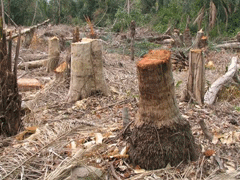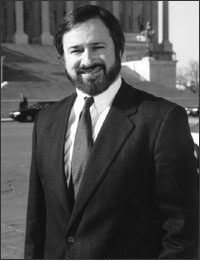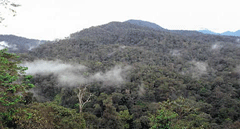Saving the Trees to Save the Planet
Air Date: Week of May 29, 2009

Deforestation in Bolivia. An estimated 20 percent of global greenhouse gas emissions come from deforestation.
International plans to preserve forests-- and the carbon dioxide sequestered in them-- have found a friend in the Waxman-Markey climate change bill. The House legislation would set up cap and trade revenues to help stop deforestation abroad. Host Steve Curwood talks with Alden Meyer from the Union of Concerned Scientists about what the legislation could mean for U.S. and global emissions.
Transcript
GELLERMAN: From the Jennifer and Ted Stanley studios in Somerville, Massachusetts, this is Living on Earth. I’m Bruce Gellerman
CURWOOD: And I’m Steve Curwood.
The Waxman-Markey climate change bill now moving through Congress aims to reduce the level of green house gas emissions in the U.S. by 17 percent compared to 2005.
But there's another part of the bill that could cut emissions by another ten percent or more. It’s called "avoided deforestation", and it involves paying developing countries to keep their carbon-sequestering forests standing. Avoided deforestation is a key part of the UN climate negotiations that are resuming in early June in Germany. Joining us now is Alden Meyer, he’s director of strategy and policy for the Union of Concerned Scientists.
Welcome, Alden.
MEYER: Good to be with you, Steve.
CURWOOD: So, tell me, what could avoided deforestation in other countries do for U.S. plans to reduce greenhouse gas emissions? I mean, just how big a deal is this?

Alden Meyer of the Union of Concerned Scientists.
MEYER: Well, it’s a very big deal. Deforestation globally accounts for about twenty percent of worldwide CO2 emissions, carbon dioxide emissions. That’s roughly equivalent to the total emissions of the U.S. or the total emissions of China. And it’s more than the total emissions from all the vehicles, planes, buses, trains and ships in the world. So it’s a big deal. What is happening in the U.S. is the Waxman-Markey bill which is now moving thought the House includes a set aside of five percent of the allowances for emissions. We estimate that that would roughly be equivalent to three billion dollars a year in 2012 when the law takes effect, ramping up to about five billion dollars a year by 2020. And estimates are that for roughly twenty billion dollars a year you could probably cut that rate of deforestation in half. So the U.S. contribution of five billion dollars would go part of the way towards reducing deforestation over the next decade. In terms of emissions, the estimates are that this could result in emission reductions equivalent to about ten percent of U.S. current emissions.

Deforestation in Bolivia. An estimated 20 percent of global greenhouse gas emissions come from deforestation.
CURWOOD: So coming up in Bonn, Germany in June the world continues to talk about how to update the Kyoto Protocol. So how might the U.S. plans to pay for avoided deforestation in developing countries help our negotiating position there?
MEYER: Well, I mean, obviously one of the big issues of contention among many in this process is how ambitious the U.S. domestic target is. Most of the world would like to see us do substantially more than what the President committed to during the campaign or the target that’s in the Waxman-Markey bill, which would reduce emissions about seventeen percent below current levels or about four percent below what our emissions were in 1990, which is the benchmark used in both the Rio Treaty and the Kyoto Protocol.
CURWOOD: Parse that out of me a little bit more, Alden Meyer. How far away are we in terms of numbers from what other countries around the world would like to see?
MEYER: Well the bench mark that’s been talked about since the Bali negotiations two years ago is that industrialized countries as a whole – that’s Europe, Japan, the U.S. Russia, Australia, New Zealand, Canada, etc. – should be shooting to reduce their collective emissions by 25 to 40 percent below 1990 levels. The Waxman-Markey bill gets us domestically to about four percent below 1990 levels. If you add in this deforestation reduction funding that’s part of the bill, that gets you to roughly sixteen percent below 1990. That doesn’t get us fully into the range, but this is a significant achievement to have this provision in Waxman-Markey, which adds to the global lift towards meeting the reductions we need to avoid the worst impacts of global warming.
CURWOOD: Alden, to what extent can we buy our way out of making painful domestic emissions reductions?
MEYER: Well I don’t think this is seen as buying our way out, actually. The funding for reducing deforestation would not be an offset or a credit against our domestic reductions. It would not make them any easier. It would be on top of, which is one of the advantages of it in terms of the global negotiations. The other point to make here is, of course, we disagree with the whole premise that its painful and sacrifice and harmful to make reductions at home. In fact, our analysis released last month in testimony before the House Energy and Commerce Committee showed that you could get significantly deeper reductions in emissions domestically than the current Waxman-Markey bill calls for at net savings to American consumers of $900 per household through reduced energy bills. So this whole notion that it has to be painful to use energy more efficiently, to deploy cleaner resources like renewables – we disagree with.

Forested hills in Kalimantan, Indonesia, where efforts are underway to sustainably manage the country’s carbon-rich forest and peatlands.
CURWOOD: This might be a good deal for the U.S., but what about the developing countries that we’ll be paying to do these reductions in terms of avoiding deforestation?
MEYER: Well it actually helps them as well because these funds will be used to provide alternative livelihoods and compensation to people that now make their living by cutting down the rainforests. In many cases, they would like to preserve the rainforest for future use and all the benefits they provide, particularly to indigenous people and others. But economics are forcing them to clear the land, burn down the rainforest, clear it for agriculture or for timber harvesting. This would provide an alternative income stream to recognize the value that these rainforests have in taking carbon up out of the atmosphere and storing it. It’s basically ecological services if you will, which right now they’re getting no compensation for. So if we can get the rest of the world, the other industrialized countries to join with the U.S., with countries like Norway that have already committed substantial money for this, this will actually be helping these countries get on a more sustainable development path.
CURWOOD: President Obama came into office pledging really to lead on climate change. How does this plan for the Democrats bolster or weaken that claim?
MEYER: Well I think it helps that claim, Steve, in the sense that it shows that he has at least part of Congress behind him going into this negotiating meeting in Bonn in June. He’s gotten across the first hurdle; Waxman and Markey have by getting this out of the Energy and Commerce Committee in the House. Obviously it still needs to go though the full House of Representatives and then probably the toughest hurdle of all, getting 60 votes on the Senate floor to be able to pass the Senate and go to the President’s desk. Of course when you get to the substance of the bill, I think the world would still like to see a higher level of ambition on the U.S. domestic target. And you’ll see the administration continue to be pressed for that by the Europeans, the Japanese, the Chinese and others, but it’s sort of a demonstration of good faith that the President at least has his own party and actually one Republican on the committee, Mary Bono from California, going along with this. So that’s, it’s a down payment. I think it gives them some credibility going into this next negotiation.
CURWOOD: Alden Meyer is Director of Strategy and Policy for the Union of Concerned Scientists. Alden, thanks so much for your time.
MEYER: Good to be with you, Steve.
Links
Learn more about REDD from the Union of Concerned Scientists website.
Learn more about a REDD framework in the United Nations
For analysis and opinions on the potential pitfalls of REDD, click here.
Click here for more on U.S. efforts to implement avoided deforestation.
Living on Earth wants to hear from you!
Living on Earth
62 Calef Highway, Suite 212
Lee, NH 03861
Telephone: 617-287-4121
E-mail: comments@loe.org
Newsletter [Click here]
Donate to Living on Earth!
Living on Earth is an independent media program and relies entirely on contributions from listeners and institutions supporting public service. Please donate now to preserve an independent environmental voice.
NewsletterLiving on Earth offers a weekly delivery of the show's rundown to your mailbox. Sign up for our newsletter today!
 Sailors For The Sea: Be the change you want to sea.
Sailors For The Sea: Be the change you want to sea.
 The Grantham Foundation for the Protection of the Environment: Committed to protecting and improving the health of the global environment.
The Grantham Foundation for the Protection of the Environment: Committed to protecting and improving the health of the global environment.
 Contribute to Living on Earth and receive, as our gift to you, an archival print of one of Mark Seth Lender's extraordinary wildlife photographs. Follow the link to see Mark's current collection of photographs.
Contribute to Living on Earth and receive, as our gift to you, an archival print of one of Mark Seth Lender's extraordinary wildlife photographs. Follow the link to see Mark's current collection of photographs.
 Buy a signed copy of Mark Seth Lender's book Smeagull the Seagull & support Living on Earth
Buy a signed copy of Mark Seth Lender's book Smeagull the Seagull & support Living on Earth

